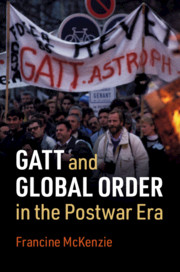Book contents
- GATT and Global Order in the Postwar Era
- GATT and Global Order in the Postwar Era
- Copyright page
- Dedication
- Contents
- Figures
- Tables
- Acknowledgements
- Abbreviations
- Introduction
- 1 Accidental Organization
- 2 ‘An Arrow in the Western World’s Quiver’
- 3 ‘Take It or Leave It’
- 4 ‘Spread Like the Plague’
- 5 ‘Rich-Man’s Club’
- 6 ‘Agricultural Anarchy’
- Conclusion
- References
- Index
Introduction
GATT in World Affairs
Published online by Cambridge University Press: 02 May 2020
- GATT and Global Order in the Postwar Era
- GATT and Global Order in the Postwar Era
- Copyright page
- Dedication
- Contents
- Figures
- Tables
- Acknowledgements
- Abbreviations
- Introduction
- 1 Accidental Organization
- 2 ‘An Arrow in the Western World’s Quiver’
- 3 ‘Take It or Leave It’
- 4 ‘Spread Like the Plague’
- 5 ‘Rich-Man’s Club’
- 6 ‘Agricultural Anarchy’
- Conclusion
- References
- Index
Summary
The introduction situates GATT in relation to new approaches in international history and to political science literature on hegemony, trade and peace, the relationship between domestic and international spheres, and the agency of international organizations. It explains the main premise of the book – that trade is an essential component of global politics – and sets out the book s revisionist goals: to understand the role of international organizations in world affairs; rethink our understanding of the nature, drivers, and priorities of postwar international relations; and interrogate claims about the liberal global order that was established after the Second World War. Finally, it describes the four thematic case studies in the book: GATT in relation to the Cold War, the EEC and other regional trade agreements, development, and agriculture.
Keywords
- Type
- Chapter
- Information
- GATT and Global Order in the Postwar Era , pp. 1 - 25Publisher: Cambridge University PressPrint publication year: 2020

